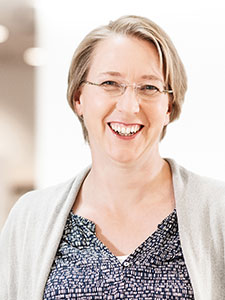Altogether, there are 17 SDGs with 169 targets. These together comprise the 2030 Agenda for Sustainable Development. To achieve the ambitious goals set out in the 2030 Agenda, the UN Global Compact has set up nine Action Platforms to advance responsible business activities. Currently, UPM participates in the “Decent Work in Global Supply Chains” and “Reporting on the SDGs” Action Platforms.
“The goal of the SDG Reporting Platform is to support companies to report on the SDGs in a way that is straightforward, provides value to relevant stakeholders and allows us to better measure and compare business impact on the SDGs. Ultimately, through better corporate SDG reporting and increased transparency, we want to improve corporate sustainability performance,” says Bernhard Frey Senior Manager, SDG Impact and Reporting, UN Global Compact.
He adds that the platform work touches upon all SDGs. Many businesses have already started to align their strategies with the SDGs or to reference them in their annual reports. “However, best practices in corporate SDG reporting have not yet been established, so our aim is to consolidate and promote corporate SDG reporting in a way that is valuable for businesses but also for stakeholders like governments, civil society and investors,” says Frey.
“All SDGs and their targets are potentially relevant to business and business can play a role in achieving all of them. We want to help companies identify and report on the SDGs targets that are most relevant to them and to relevant stakeholders, based on their own materiality and impact assessment,” he notes.
“There is a shared understanding that the implementation and achievement of the SDGs and the 2030 Agenda will require a collective effort by all relevant actors in society. In this context, businesses need to understand and assess their actual and potential impact on the SDGs and prioritise their action accordingly. We can provide guidance for that.”
Leading the way
The goal of the Decent Work Platform is to improve the responsibility performance of supply chains.
“This is a very large area that includes issues like work legislation and bans on corruption. No one can solve these issues alone, so we need broad cooperation between companies and legislators,” explains Nina Norjama, Director, Responsibility Development & Support at UPM.

Nina Norjama
All UN member countries must also present an action plan outlining how they implement SDGs in practice. On the government side, UN high-level political forums are reviewing how governments are advancing and implementing the 2030 agenda and the SDGs.
“The Decent Work Platform aims to bring legislators and companies together in certain countries to discuss supply chain responsibility issues. Companies cannot proceed without the support of society, so we hope that together with LEAD companies and other stakeholders we can make progress in this area,” she adds.
UPM reports its SDG progress in its Annual Report, aligning 12 UN Sustainable Development Goals as a part of the company’s responsibility targets.

Gabriele Wende
The Reporting Platform aims to make SDG targets more understandable for companies so that they can take a step forward in implementing those targets.
“For example, UPM is following lost time accident frequency as one of the Health and Safety indicators in its reporting. This indicator does not fit directly with one of the specific SDG targets, although it fits well with the general Good Health and Well-being SDG goal,” says Gabriele Wende, Director, Reporting and Product Stewardship at UPM.
“There are good discussions in the group, so we have an excellent opportunity to share our views with other people dealing with the same issues but also to find a solution that is both practical and forward-looking,” she adds.
Mutual benefits
Bernhard Frey adds that the Action Platforms create mutual benefits for all participants, especially as stakeholders want to understand how businesses are affecting and contributing to the SDGs. “Along with governments and civil society, investors too have a growing need for non-financial sustainability information about corporations, which includes SDGs. In practice, that means providing comparable SDG data in a simple and accessible way that informs investor decision-making processes.”
The UN Global Compact will play a leading role in fostering understanding and promoting impact assessment in the years to come. “The Global Compact can play a key role in helping governments better understand how companies are acting on and impacting the SDGs. In addition, by working with the Global Compact, responsible businesses can showcase their true leadership and commitment to sustainability,” concludes Frey.
Vesa Puoskari
